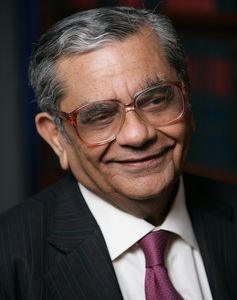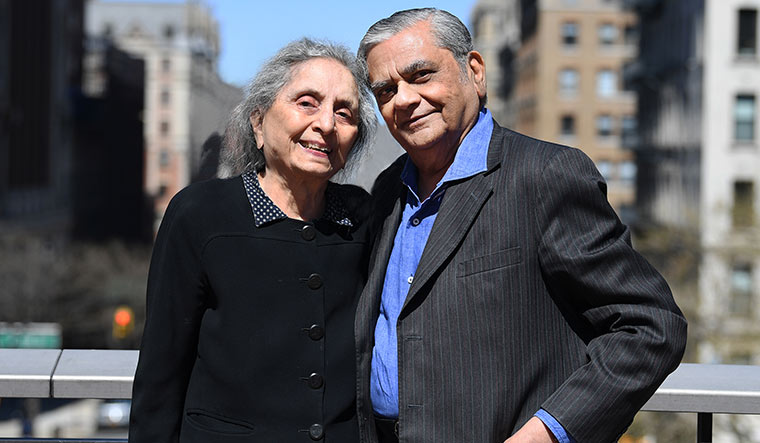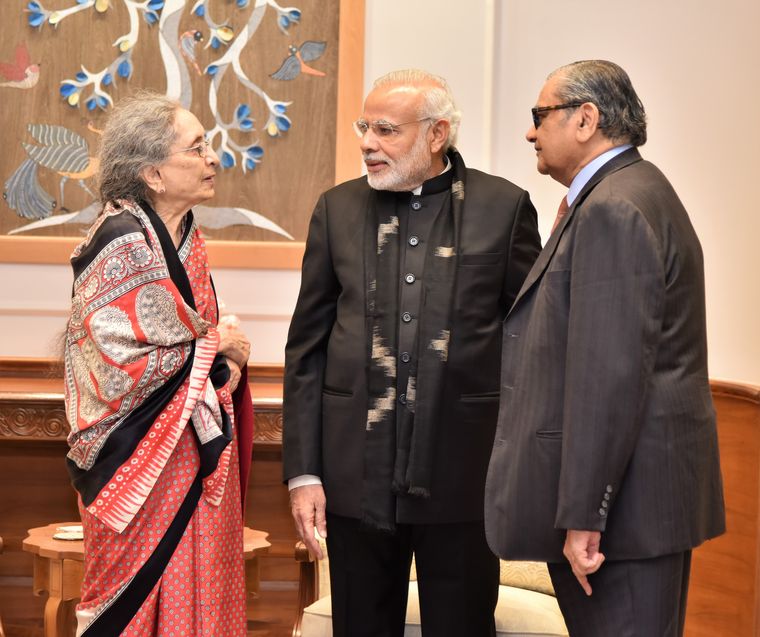Interview/ Jagdish Bhagwati, economist
When Jagdish N. Bhagwati speaks, people listen, be it about the future of a country’s economy or something as mundane as the price of eggs. His words carry weight. So it is hard to believe that this scholar, author and free trade theorist could once upon a time speak no English and knew only Gujarati. Growing up in a vegetarian family, he had never seen an egg, let alone tasted one. “I didn’t even know there was such a thing as brown eggs until I came to London,” he jokes, with a chuckle.
In a rich career of five decades he has circled the globe and made his mark on varied fields from economics to immigration, law to political science.
“He is widely regarded as the intellectual father of the Indian economic reforms that Prime Minister Manmohan Singh brilliantly initiated and led, transforming India from a lagging performer with abysmal growth rates into a rapidly growing force on the world stage,” noted Columbia Law School when it established the Jagdish Bhagwati Chair in Indian Political Economy. Bhagwati is probably the only professor in American academia to have a chair named after him while he is still teaching at the university.
A University Professor (economics, law and international affairs) at Columbia University, he is married to Padma Desai, herself a noted economist. She is professor of comparative economic systems emerita and a specialist in the Russian economy. They have donated millions of dollars to Columbia and other universities.
Bhagwati, 85, is a thought leader who astutely maps out emerging trends in globalisation, free trade and immigration. He has been an adviser to the UN and WTO, has published hundreds of articles and books, and has received 18 honorary degrees.
Graduating from Cambridge in 1956, Bhagwati studied at Massachusetts Institute of Technology and Oxford University, and returned to India in 1961 as professor of economics at the Indian Statistical Institute, and then was professor of international trade at the Delhi School of Economics. He taught at MIT for 12 years before joining Columbia University. In spite of his high status, he is gregarious and down-to-earth, and delights in telling amusing yarns about his history.
He grew up in a family of high achievers—he and his eldest brother, P.N. Bhagwati, who was chief justice of India, are both recipients of the Padma Vibhushan. Another brother is the neurosurgeon S.N. Bhagwati. Their father, N.H. Bhagwati, was a judge of the Supreme Court.
“Basically we weren’t given any kind of indulgence at all—except affection, of course,” he recalls. “There were hardly any movies to be seen and if I told my father I would like to go to a restaurant, he would say ‘Well, whatever you want to eat, your mother will make for you at home. We are not going to waste money.’ But I could spend thousands of rupees on books at the local bookstore—there was an open account.”
All his brothers were involved in the independence movement—a brother had lost his teeth in a lathi charge and Bhagwati has vivid childhood memories of being woken up in the middle of the night by the police who were looking for one of his brothers. He concludes, “So it wasn’t the training you get in school or knowledge; it was this entire complex of values which were given. I have been pretty independent and outspoken, and I say what I think.”
The Bhagwatis have one daughter: Anuradha Christina, who has followed her own path, first as a captain in the US Marines and then as an activist who formed the nonprofit Service Women’s Action Network (SWAN), and is the author of the book Unbecoming. Bhagwati feels she carries on the best traditions of the family in doing socially relevant work.
The economist derives the most pleasure from his students, several of whom have gone on to become international economists. “I never cut a class,” he recalls. “I’m just very fond of my students and I have an open-door policy.” The esteem his students hold him in can be seen from the extended celebrations for his 70th birthday, which included no less than six festschrifts (the word means writing to honour) dedicated to him by former students, colleagues and admirers worldwide.
Bhagwati enjoys going to the opera and eating out in New York, and believes that reading poetry and novels makes him a better economist. He is amused by the media’s abiding interest in when he will get the Nobel Prize (even the Simpsons weighed in on this). Discussing the Nobel to-be-or-not-to-be with David Pilling of the Financial Times, the economist—who has a penchant for witticisms and sharp, literary attack—joked: “I should probably get one for literature instead.”Excerpts from an exclusive interview with the guru of free trade:
Q/ Time and again you have emphasised the importance of economic growth. How do you see India slipping?
A/ Growth everywhere is under siege. But India remains one of a few countries, US being another, that have managed to do well, though there are some problems to be addressed by Prime Minister Modi through policy adjustment.
Q/ Many economists say India is yet to recover from the effects of demonetisation and it is evident from the current slowdown. Is it so?
A/ It has become fashionable in some circles to attack demonetisation. But I do not share this critique….
There were undoubtedly some glitches in the rollout of the policy. But are there any such “huge” policy measures that will not have glitches? Importantly, the government was continually trying to adjust the policy to take care of the glitches as they were emerging.
Q/ Should the government be worried about GST collection not going up?
A/ GST is a clear triumph for Prime Minister Modi. Critics have argued that there were too many different tax categories. But you have to get your foot in the door. You can always simplify the different rates into fewer rates down the road. Since the BJP traditionally counted petty traders as their supporters, it is also noteworthy that PM Modi reached out, through GST, to a wider constituency in both the national and his party’s interest. As for the revenue collection at present, I attach no significance to what happens in a year or two.
Q/ You once said populism as an objective is okay, but populism as a political instrument is disastrous. How do you distinguish between them?
A/ Populism as an objective means that you are for the people. By that, we mean that our objective must be to help the people: the poor. But if we use populist measures to achieve this objective, that is counterproductive. Example: Simply redistributing income—as my friend Amartya Sen has often argued, instead of embracing policies that encourage growth that lifts the poor into gainful activity and generates revenues that additionally can be used to provide education and nutrition to the poor (as Professor [Arvind] Panagariya and I have argued in our book, Why Growth Matters)—means that the former Sen-type prescriptions are “populist”.
Fortunately, the populist prescriptions are increasingly regarded as such in India, and the appeal of economists like Sen is no longer taken seriously.
Q/ The richest 1 per cent of Indians own about 60 per cent of wealth. This inequality has only been widening. What is stopping a fairer distribution?
A/ There are no reliable data on income and wealth distribution in India, despite occasional assertions on this by [Thomas] Piketty, etc. There are also no good models on how such “inequality” arose and will evolve over time. An important point here: the assertion that the top 1 or 10 per cent get the bulk of increased income with growth is bad economics and worse politics. The top 1 or 10 per cent is not a static group: people come in and people move out.
I asked a French colleague why Piketty had not mentioned Thomas Mann’s classic [novel] Buddenbrooks, where the third generation did not make it. His amusing answer: In France, we do not consider German literature to be literature! Also, Piketty cites Jane Austen’s Pride and Prejudice. But I doubt he has read it: Mr Darcy, despite both status and wealth, gets nowhere with Elizabeth Bennet, who wipes the floor with him.
In India, new entrants into the top 10 per cent have increased as the licensing system has been eliminated, more or less. And doubtless many dynasties in business no longer dominate the scene. Perhaps my leftist friends, whose grasp of reality leaves a lot to be desired, must come to terms with the fact that their friends in political parties such as the Congress are the ones where dynasties still prevail!
Q/ Despite being a big economy, India accounts for a minuscule of global trade. How can it fix this, and what impact would the trade war between the US and China have on India?
A/ PM Modi has failed to make a dent on protectionism, while he had done so in Gujarat as the chief minister. We need to open up far more than we have. The problem is that, at the Centre, the bureaucrats are stuck in protectionist attitudes of the past. Lenin used to call their role “treason of the clerks”. Unfortunately, this has also meant that, even as the United States tries to shift supply lines away from China, these go to Vietnam and to Bangladesh, a basket case, while we twiddle our thumbs and fail to exploit the opportunity!
The PM must wake up and see that what worked for Gujarat can work also
for India.
Q/ A lot of commentators say there is a rising tide of intolerance in India. What kind of an effect does it have on India’s reputation and economic growth?
A/ There is endless talk among just a handful of critics—mostly sociology, political scientist and comparative literature types whose claim to fame is just one or two mediocre books cited only by themselves, who mainly echo one another—of increased intolerance in India. But I will confine myself to just three observations.
First, the PM has followed the secular policies similar to those of Jawaharlal Nehru, in appointing minorities to prominent positions. For example: the ambassador to the UN is the distinguished diplomat Syed Akbaruddin. The ambassador to Washington was until recently a Sikh.
Second, the PM’s slowness in condemning violence must be judged against the fact that, as the PM, he has to weigh multiple explanations frequently of what happened. When President Obama hastily condemned the intrusion by the Cambridge police against the African-American Professor Henry Louis Gates in his own home, he was left twisting in the wind by the liberal Harvard faculty (including my friend Amartya Sen, I believe), none of whom came to his defence!
Third, the truly massive attack on a minority, the Sikh community, was in Delhi after Mrs Gandhi was assassinated. This was really a pogrom in the sense that the victims were one ethnic group. Did the current critics of PM Modi condemn that pogrom and return their honours and awards at the time?
The Gujarat violence against Muslims after Godhra was, by contrast, not a pogrom: both Muslims and Hindus were killed if you count in the Godhra killings of the Hindus. As chief minister of Gujarat at the time, he wanted to honour eminent Gujaratis soon after. I did not want to go until the cloud over chief minister Modi was lifted by proper inquiries (as it has happened subsequently). So, I excused myself from attending, while Ratan Tata and Mukesh Ambani went. Did my leftist friends, who go by propaganda against PM Modi, have the moral courage to do something similar, like returning their Padma awards for instance, over the despicable Sikh pogrom?
Their moral outrages, based on unfounded assertions, are shields behind which they hide their love of privilege and personal greed.
Fourth, there is no evidence that the minorities like Parsis and Christians have been discriminated against or subjected to violence. Coming from Mumbai, I find it ludicrous that there has been criticism of how they have been treated. For instance, when I investigated the claims that Christians were being discriminated against, I found these claims to be baseless…. And Parsis are among the most beloved of our minorities.
I might add that the situation of Muslims is different for the simple reason that, unlike what some historians have argued, their situation cannot be regarded as parallel to that of slaves in the US and untouchables in India. This is because Muslims ruled India under the Mughals. So, we are dealing with a situation where the rulers have lost their privileged status. If we do not take this into account, our ability to treat the problems faced by Muslims will be limited.
It is also ironic that many critics condemn PM Modi for attacking the freedom to write. If this were true, how come they continue to criticise without any retribution? But logic is not their strong suit.
Q/ What has been your connection to books? Are you writing a new book?
A/ The secret in the Bhagwati family’s success was that my father was bringing up seven sons, one daughter and two cousins, and he himself came from a poor family, so he never gave us money to eat in the school cafeteria, but we could spend hundreds of rupees on books at the bookstore! We were therefore brought up with the right values.
Yes, I am writing a new book. It is titled A Magical Life: Eminent Economists I Have Encountered. I have been in so many different universities, and have met so many eminent economists, and have a flair for anecdotes, witticisms, and putting economic ideas across to laymen. So I think this book will be a great success.
I am also shortly finishing a book titled Poverty, the Pope and Mr Piketty based on Endowed Lectures I gave at London School of Economics and in Berlin. It will argue that the pope does not understand that postwar experience has taught us how to reduce poverty, contrary to what he often asserts, and that Piketty is mistaken in his strictures against capitalism for unequal income and wealth distribution.
Q/ What kind of influence the long-standing dispute between you and Amartya Sen (growth vs redistribution) has had on policy?
A/ I must say that I have long argued that redistribution cannot solve India’s poverty problem. While the matter is treated exhaustively in the Bhagwati-Panagariya book Why Growth Matters, let me just mention one point. When there is a huge amount of poverty, redistribution will have minimal effect: instead of one chappati a day, the poor will get at most two a day! Besides, even that improvement will be drowned out unless growth increases the resources which can finance the redistribution.
I have made it a point never to address Sen’s errors directly, because the newspapers like to make everything into a Bhagwati versus Sen tamasha; it sells newspapers!
I might also add that Sen has never agreed to debate me (just like Joe Stiglitz, my colleague who likes to surround himself with “chamchas” and refuses all invitations by me and our Columbia students to debate him). Amusingly, when Sen took on Professor Panagariya whom he treated with condescension on TV, he attacked him foolishly by saying that he was incompetent to talk about India as he spent his time in the USA; Professor Panagariya wiped the floor with him by saying that he spent more time in India than Sen!
Q/ Are you hopeful about the direction India is going in? What would be the one thing you would suggest to the prime minister?
A/ The PM hardly needs any advice on economic policy, except for the fact that he must push strongly for opening up the economy far more. But he can do with many “social” initiatives. When I last met him in Delhi over a year ago, we discussed several policy initiatives in that regard. Thus, the Roma or Gypsies in Europe are in fact from Gujarat. They have been persecuted, even killed in the Holocaust along with the Jewish people. Why don’t we extend to them our hand and help them: for example, by giving them fellowships to our medical colleges to become doctors who can go back and serve their own communities?
Also, we could recognise with Padma awards the many Muslim and some Hindu musicians who flourished at the Baroda Court. Such awards could also be extended in a gesture of goodwill to the astonishing singers in Pakistan whom we enjoy listening to.
Also, Professor Ravi Kalia and I have written that the Nalanda University initiative—which was mired in the corruption of its leadership led by Amartya Sen that the President of India highlighted—be replaced by an initiative that turns Nalanda and several other such medieval sites into a series of museums around the country, with schoolchildren being taken around to them, giving them a sense of our accomplishments and also a sense of India as a nation. It is time for India, under this amazing PM, to seize the moment by embracing these and other “social” initiatives.
Melwani is a New York-based journalist.




